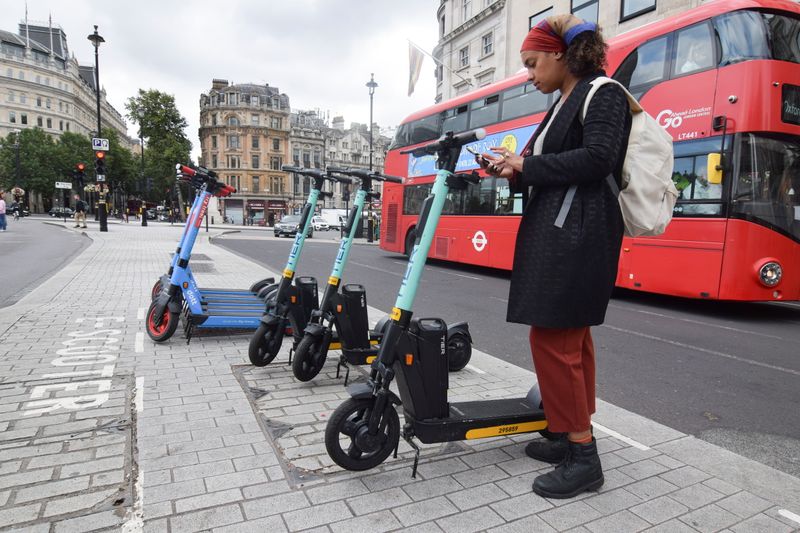After Wild West start, scooter providers chase scale to survive By

© Reuters. Georgia Yexley, UK and Ireland head of cities at micromobility firm Tier, gets ready to demonstrate an e-scooter in London, Britain, August 25, 2021. Picture taken August 25, 2021. REUTERS/Nick Carey
2/6
By Nick Carey and Carolyn Cohn
LONDON (Reuters) – The era of breakneck growth for electric scooter firms is giving way to more selective expansion focused on profits as they face tougher regulations, more demanding customers and wary insurers.
Hurt badly by global coronavirus lockdowns last year, companies offering by-the-minute rental of e-scooters say ridership is soaring to pre-COVID 19 levels among urban consumers eager to avoid public transport or taxis.
But that doesn’t mean the app-based industry is returning to the free-wheeling, pre-pandemic world where “micromobility” firms were loosely regulated and raked in money from investors.
Scooter firms now face cities that are using licensing to limit the number of operators, consumers demanding better software and vehicles, and insurers leery of safety risks.
This is forcing up costs and will push the low-margin industry towards further consolidation. Some smaller providers have already been snapped up, including Boston-based Zagster, bought by transport technology company Superpedestrian in 2020, and San Franciso-based Scoot, taken over by Bird Rides in 2019.
“It really takes scale to get the economics to work,” says Travis VanderZanden, CEO of Santa Monica-based Bird, which is due to go public via a merger with special purpose acquisition company (SPAC) Switchback II Corp. “So I think we’re going to see some of the smaller players fall by the wayside.”
Bird is a global player that expects revenue to double in 2021 from a pandemic-hit 2020, and then double again to $400 million in 2022. That is still small compared to a car-based ride hailing company such as Uber (NYSE:), which had gross revenues of $4.1 billion in 2019.
Bird’s planned merger – which will go to a Switchback II shareholder vote on Nov. 2 – values the company at $2.3 billion, about 20% below its January 2020 price tag, according to startup data platform PitchBook. Lime, also a global player, saw its valuation fall nearly 80% during a June 2020 funding round from one less than a year earlier.
While the pandemic battered valuations at the top, an analysis by Reuters found it also cut off funding for many smaller e-scooter providers.
“There are a lot of companies that can’t invest in hardware, can’t invest in safety features and can’t invest in training,” says Wayne Ting, CEO of Lime, whose investors include Uber. Lime acquired Uber’s micromobility unit Jump.
The current environment is a far cry from 2017 when electric scooters accessed through smartphone apps first appeared in large numbers. A flood of new providers created “Wild West competitions” as predominantly European cities hosted unlimited numbers of vendors, said Candice Xie, CEO of Chicago-based Veo, which operates in more than 40 U.S….
Read More: After Wild West start, scooter providers chase scale to survive By
